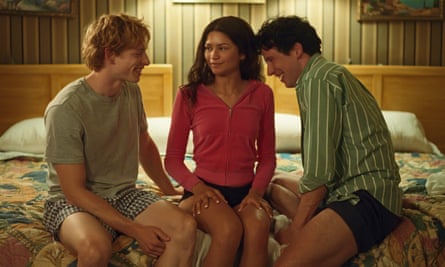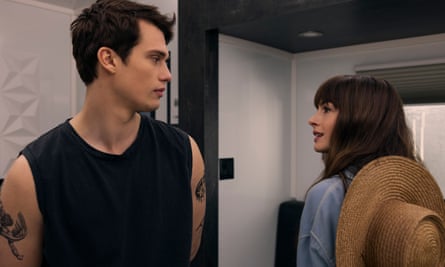The success of Hit Man, Richard Linklater’s new comedy that has garnered glowing reviews heralding Glen Powell’s emergence as a true movie star, largely boils down to one factor: illicit attraction. It’s the kind that powers fantasies and a good portion of human behavior, whether we’d like to admit it or not.
There’s the pull of Powell’s Gary, a nerdy thirtysomething psychology professor in New Orleans, moonlighting as an undercover impersonator of hired killers, trying on different, more confident identities for size. There’s the longstanding, vicarious thrill of watching ethically dubious protagonists flitter through a well-oiled crime caper. And most especially, there’s the heat between Gary, in disguise as a suave hitman, and Adria Arjona’s Madison, a potential client with whom he has the type of identity-incinerating sex that leads to cocooning in a townhouse and making unwise choices.
Whether or not the chemistry or the moments of sex in Hit Man – still relatively rare for the big screen these days – turns you on is between you and your screen of choice (the film, regrettably, only got a short theatrical release before its move to Netflix this weekend). But the fact that Hit Man is trying to – with panache, taut mind games and movie-star charisma – makes the film a throwback, of sorts, to the sexy, starry Hollywood movies of yore. The film invokes not only Hollywood’s long-running fascination with ruthless hired guns, but also 1940s screwball films, lush 90s romantic comedies and, in Gary’s dumbstruck lust and Madison’s inscrutable motivations, recalls the peak 80s erotic thriller Body Heat. Hit Man knowingly plays with fantasy: what people imagine of a hitman, how two characters are transformed by sex and the type of hot, smooth hyper-competence that can only be fulfilled on screen. (The ruggedly handsome Powell, for what it’s worth, is never convincing as an IT nerd.)
Hit Man is the latest film this year to suggest that Hollywood is trying to bring sexiness, if not always actual sex, back to the big screen, at a time of superhero fatigue, years of relative sexlessness on screen and routine box office woe. Powell is coming off a starring turn opposite Sydney Sweeney in the sleeper hit Anyone But You, the rare R-rated romcom which grossed $219m through word-of mouth and TikTok; this summer, he’ll lead Twisters, a standalone sequel to the 90s disaster flick that, as one Letterboxd reviewer memorably put it, teaches that good storm chasers must want to “fuck the storm”. (“You don’t face your fears. You ride ’em,” says Powell in the trailer, suggesting a faithful adaptation). Love Lies Bleeding, starring Kristen Stewart and Katy O’Brian, gives the neo-noir a sapphic twist, two sweaty female bodies entwined in various states of undress.

The mere suggestion of a threesome between tennis players Tashi (Zendaya), Art (Mike Faist) and Patrick (Josh O’Connor) in Luca Guadagnino’s lustful Challengers sent the internet into a tizzy – and theaters to sell throuple ticket discounts – upon release. Anne Hathaway, who became famous during the sunset days of the mid-budget theatrical film, lent her talents to Amazon’s The Idea of You, a premium-grade adaptation of One Direction fan fiction in which a 40-year-old Los Angeles mom has a taboo affair with a fictionalized Harry Styles. A similar premise – famous younger man dating middle-aged mom – is presented with Netflix sheen in A Family Affair, starring Zac Efron and Nicole Kidman, due later this month.
Judging by the screams at The Idea of You screening I attended, among a slew of other metrics, the culture needs it. Though 2023 marked a relatively good year for sex on screen, from Poor Things to Saltburn to All of Us Strangers and a wave of R-rated raunch comedies, sex in cinema has been on the decline for over a decade, owing to the demise of mid-budget adult films and the predominance of four-quadrant superhero fare. The number of sex scenes in US movies in the 2010s was the lowest in decades, on par with the 1960s, according to a study by the Black List’s Kate Hagen using IMDb data. A study by the Economist, looking at sexual content (excluding assault) in the 250 top-grossing films per year, found a 40% decrease since 2000.
In other words, the bar is low – low enough that most of these newer films coast on the mere suggestion of sex, and the simple prioritization of desire, rather than actual graphic sex scenes. The Fall Guy, Hollywood’s most recent box office disappointment, was a romp of sexy spectacle – pyrotechnics, car chases, elaborate stunts for Ryan Gosling’s stuntman character to win back his lost love (Emily Blunt) – without any actual sex. Challengers arguably contained less actual sex than its marketing material sold, but the film luxuriated in the energy of it. Characters dripped sweat; Guadagnino served up shots of his stars’ bodies in motion to Trent Reznor and Atticus Ross’s club-ready score; and in the film’s climax of long-simmering desire, a windstorm seems to collect every stray paper in suburban New York. The movie does not depict actual fucking, but definitely fucks – a frenetic brew of tension liable to wind you up till 5am.
after newsletter promotion

Amazon’s The Idea of You is similarly powered more by the imagination of illicit sex than its actual depiction. Like Hit Man, The Idea of You also feels like a throwback: a decently made romance with the budget to match (counterfeit 1D tracks included) that treats the whims of celebrity romance fantasy seriously, with a true movie star lead. Hathaway’s improbably named Solene may be impeccably glamorous, but she’s also in her 40s – the age at which Hollywood still notoriously sends women out to pasture. And yet her maturity, her experience, her lack of interest in the spotlight, draws the attention of a much younger star, who whisks her away to penthouse suites, VIP areas and French villas, with some steamy makeouts in lingerie mixed in. The film, directed by Michael Showalter, smartly blends airport-novel breeziness with just enough edge, dispelling the myth of allegedly “post prime” women; a treat of longing stares and passionate kisses, plus a little commentary.
While the attractions in these films may be illicit – unusual and besieged by (often misogynistic) online judgment in The Idea of You, between a “killer” and someone capable of hiring one in Hit Man, complicating a tangle of formal and informal relationships in Challengers – they are not actually explicit or transgressive. These are not the kinks of (nor the moral panic over) the Fifty Shades of Grey films, nor the divisive gratuity and enthusiasm of Emma Stone’s shamelessly sexual Bella Baxter in Poor Things. These unabashedly horny films are aiming for straightforward – and mostly straight – fun, not so much pushing the boundaries as trying to court a large, starved audience to watch. That the small moments of charged intimacy in Challengers – the way Patrick looks at Tashi, the copious shared dust of Art and Patrick’s churros – have become shared audience touchstones and memes seems evidence that doing this level of arousal well – a relatively basic job of movies – is still a revelation.
They may or may not work, in terms of titillation; I found Challengers and The Idea of You more fun, in their unsubtle pleasures and beautiful leads, than gut-twistingly erotic. But just by predicating desire, by aiming for the ineffable and inexplicable feelings of attraction, feels in and of itself something to celebrate. Fluke of timing or not, there is a movie-going public ready to buy in to these depictions of sex, should Hollywood be willing to sell it.
Source: theguardian.com


